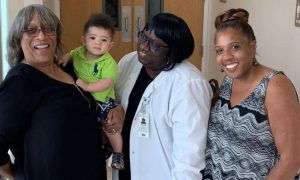Who takes care of the little ones?
Resource Type
Family Resources
Resource Topic
Share this post


by Marcos Restrepo, Counselor for Memorial Healthcare System’s Senior Services
Spanish speaking communities have made the word “abuela”, grandmother, popular.
Grandmother is a caregiver, a security blanket, a reassurance for working parents
who do not want to or cannot afford to leave their kids in a childcare center.
Parents rely on the traditional culture they were raised in to give their kids the
necessary tools to prepare for school.
Abuelas provide comfort, care, and safe play hours for babies, toddlers and even
older children. But what are the conditions of these seniors? An abuela is likely to
be an immigrant. If so, that immigrant might have ‘paid into the system’ because
she came to the U.S. many years ago and now has a Social Security pension,
Medicare and maybe Medicaid. Other seniors may have been brought over through
immigration sponsorship much more recently and have no security net. Others have
aged and are still undocumented.
Whatever the specific situation, grandparents, who are playing an important role as
everyday caregivers for many babies, toddlers and elementary school age children,
should have good healthcare coverage to make sure they are up to the task of
providing that daily care.
We need to keep in mind that the quality of the care provided might be tied into the
emotional and physical health of those grandparents.
There are older adults who are custodial grandparents: the primary caregiver of
their grandkids. According to a Pew Trust 2016 article in 2015, at least 2.9 million
children were living with their grandparents.
How does this daily care impact that senior’s life? Does that abuela have the support
to help her grandchildren start off on the right foot even when poverty gets in the
way?
According to another source, “Custodial grandparents are represented in all races
and ethnicities. However, grandparents in racial and ethnic minority groups are
overrepresented in the population of caregivers. It’s also worth noting that 67
percent are younger than age 60, and 25 percent live in poverty even though about
half of custodial grandparents are in the labor force.”
We sing the praises of our grandparents and it may be very true that they do a
great job. After all, it is their second time around. But are they themselves doing
well? Does taking care of grandchildren several days of the week break a cycle of
isolation? If not, does that abuela’s behavior have an impact on the children under
her care?
Some older adults who struggle with English and computer literacy turn to their
grandchildren to help with navigate the internet, but those kids may have difficulty
navigating the complex language of government websites.
The American Association of Retired Persons (AARP), citing 2010 US Census data,
show that in Florida over 342,000 children live with their grandparents. There are
many sources that point to countless local organizations that offer a large number of
services, but working in health education has shown us that people sometimes do
not have, among other things, the health literacy to follow through on a process that
requires reading and writing.
“71 percent of adults older than age 60 had difficulty in using print materials, 80
percent had difficulty using documents such as forms or charts, and 68 percent
had difficulty with interpreting numbers and doing calculations,” according to the
National Assessment of Adult Literacy (NAAL).
Add to this the problems that many older adults have with transportation. When told
to get on the road and get those many services, they may need additional help. A
recent Transportation for America report states that, “By 2015, more than 15.5
million Americans 65 and older will live in communities where public transportation
service is poor or non-existent. That number is expected to continue to grow rapidly
as the baby boom generation ages in place in suburbs and exurbs with few mobility
options for those who do not drive.”
Seniors are dealing with their own health issues, and as the data show, many
still work. A request for time off adds to their list of everyday challenges that can
become a source of anxiety.
A child’s wellbeing and older adult caregivers’ physical, mental and emotional health
go hand in hand. If we insist on the idea that it takes a village to raise a child, we
must include older adults in that community.
Marcos Restrepo is a Counselor for Memorial Healthcare System’s Senior Services and
coordinates Adults Living Life Independent Educated and Safe, ALLIES a program for
Broward County residents who are over 80 years of age and still live independently.


